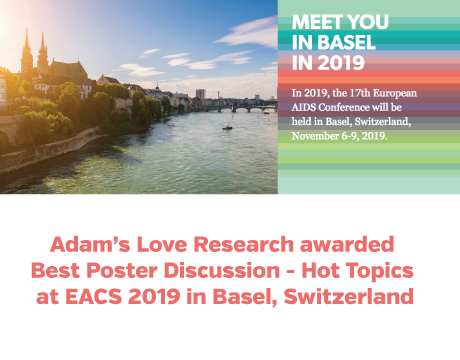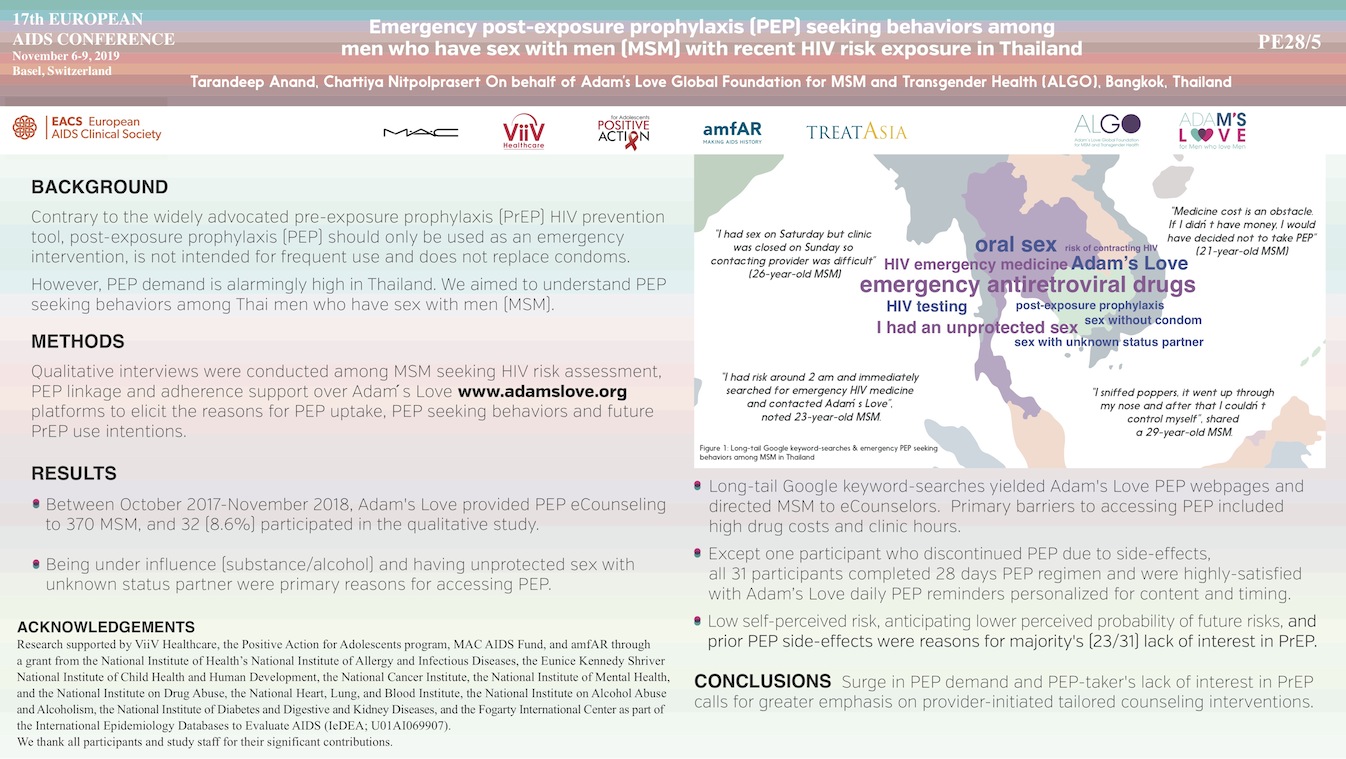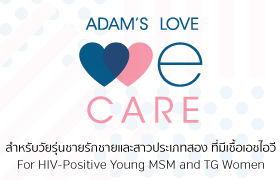|
|
Adams Love Research awarded Best Poster Discussion - Hot Topics at EACS 2019 in Basel, Switzerland Adams Love and TemanTeman.org Research awarded Best Poster Discussion - Hot Topics at EACS 2019 in Basel, Switzerland Watch presentations at EACS 2019 library BPD3/2 - Harnessing big data on Indonesian MSM and transgender individuals using temanteman.org platforms to assess their vulnerabilities, HIV support seeking patterns and immediate HIV prevention needs T. Anand1, C. Nitpolprasert1, T.H. Karjadi2, S. Djauzi2, D. Imran2, Y. Hartantri3,4, M. Lestari3,4, A.R. Ganiem4, R. Wisaksana3,4, T.P. Merati5, E. Yunihastuti2 1Adam's Love Global Foundation for MSM and Transgender Health (ALGO), Bangkok, Thailand, 2Working Group on AIDS, Faculty of Medicine, University of Indonesia, Cipto Mangunkusumo Hospital, Jakarta, Indonesia, 3Department of Internal Medicine, Faculty of Medicine, Padjadjaran University/Hasan Sadikin Hospital, Bandung, Indonesia, 4HIV Clinic, Hasan Sadikin Hospital, Bandung, Indonesia, 5Department of Internal Medicine, Faculty of Medicine, Udayana University,Sanglah Hospital, Bali, Indonesia Abstract Introduction: Indonesia is the world's largest Islamic-majority nation. Homophobia is contributing to the concentrated explosion of HIV epidemic among men who have sex with men (MSM), who for their HIV support needs resort to accessing top Google suggested websites such as TemanTeman.org, processing significant critical insights on key populations with potential for developing novel service-delivery models. Methods: Between September 2013-June 2019, datasets spread over TemanTeman.org web-logs and databases were mined to address the gaps in our understanding on Indonesian key populations through assessing their vulnerabilities, online search patterns and immediate prevention needs. Results: Over 3 million Indonesians engaged in TemanTeman.org platforms. 'How is HIV transmitted', 'HIV testing and treatment services', 'condoms and lubricants', 'HIV testing procedures (city-based)' were search queries originating primarily from Jakarta, Surabaya, Bandung, Medan, Makassar, Denpasar and Yogyakarta. Age demographics included 13- 17 years (1.3% - male 67%, female 33%), 18-24 years (35% - male 71%, female 29%), 25-34 years (45% - male 74%, female 26%) and >35 years (18.7% - male 60%, female 40%). TemanTeman.org videos featuring medical doctors from Indonesia's leading university hospitals garnered nearly 1.6 million views, watch-time 60,861 hours (equivalent to 6 years and 344 days), primarily via mobile phones (84% - Android 90%, IOS 7.3%), and computers (12% - Windows 95%, Macintosh 4.3%). Top video search trends included 1) HERPES - Skin/genital, causes, treatment, cure (63,903+ searches), 2) HIV/AIDS - early stage signs/symptoms/characteristics, vaccine, transmission, testing procedure and costs (59,850+ searches), 3) SYPHILIS - early symptoms, effective treatment (27,591+ searches), 4) HPV in men/women, symptoms and treatment (11,167+ searches), 5) GENITAL WARTS in male/female, treatment, surgical removal (11,090+ searches), and 6) GONORRHEA in men/women, treatment (10,848+ searches). Conclusion: Our study shares evidence of high sexual-risk related web-searching behaviors among Indonesians. We propose intensive real-time interventions as a way to strengthen the cascade.  PE28/5 - Emergency post-exposure prophylaxis (PEP) seeking behaviors among men who have sex with men (MSM) with recent HIV risk exposure in Thailand T. Anand1, C. Nitpolprasert1 1Adam's Love Global Foundation for MSM and Transgender Health (ALGO), Bangkok, Thailand Abstract Introduction: Contrary to the widely advocated pre-exposure prophylaxis (PrEP) HIV prevention tool, post-exposure prophylaxis (PEP) should only be used as an emergency intervention, is not intended for frequent use and does not replace condoms. However, PEP demand is alarmingly high in Thailand. We aimed to understand PEP seeking behaviors among Thai men who have sex with men (MSM). Methods: Qualitative interviews were conducted among MSM seeking HIV risk assessment, PEP linkage and adherence support over Adam´s Love (www.adamslove.org) platforms to elicit the reasons for PEP uptake, PEP seeking behaviors and future PrEP use intentions. Results: Between October 2017-November 2018, Adam's Love provided PEP eCounseling to 370 MSM, and 32 (8.6%) participated in the qualitative study. Being under influence (substance/alcohol) and having unprotected sex with unknown status partner were reasons for accessing PEP. “I sniffed poppers, it went up through my nose and after that I couldn´t control myself”, shared a 29-year-old MSM. Long-tail Google keyword-searches yielded Adam's Love PEP webpages and directed MSM to eCounselors. “I had risk around 2 am and immediately searched for emergency HIV medicine and contacted Adam´s Love”, noted 23-year-old MSM. Primary barriers to accessing PEP included high drug costs “Medicine cost is an obstacle. If I didn´t have money, I would have decided not to take PEP” (21-year-old MSM) and clinic hours “I had sex on Saturday but clinic was closed on Sunday so contacting provider was difficult” (26-year-old MSM). Except one participant who discontinued PEP due to side-effects, all 31 participants completed 28 days PEP regimen and were highly-satisfied with daily PEP reminders. Low self-perceived risk, anticipating lower perceived probability of future risks, and prior PEP side-effects were reasons for majority's (23/31) lack of interest in PrEP. Conclusion: Surge in PEP demand and PEP-taker's lack of interest in PrEP calls for greater emphasis on provider-initiated tailored counseling interventions. 17th European AIDS Conference November 6-9, 2019 Basel, Switzerland Scientific Programme 08.11.2019 Special session 12:45 – 13:45 Darwin Best poster discussion III - Hot topics Anton Pozniak, United Kingdom Marta Vasylyev, Ukraine BPD3/4 12:45 – 12:52 Novel highly potent CD4bs bNAb with restricted pathway to HIV-1 escape Philipp Schommers, Germany BPD3/2 12:52 – 12:59 Harnessing big data on Indonesian MSM and transgender individuals using temanteman.org platforms to assess their vulnerabilities, HIV support seeking patterns and immediate HIV prevention needs Tarandeep Anand, Thailand BPD3/3 12:59 – 13:06 Prescription of antimicrobials in primary health care as a marker to identify people living with undiagnosed HIV infection Raquel Martin-Iguacel, Denmark BPD3/1 13:06 – 13:13 HIV infection in individuals seeking post-exposure prophylaxis (PEP): a retrospective data linkage study Frédérique Hovaguimian, Switzerland BPD3/5 13:13 – 13:20 Effect of noresthisterone, combined contraceptive vaginal ring (CCVR) and COCPs on HIV cervical target cells in adolescent girls: a randomized crossover study Iyaloo Konstantinus, South Africa |

















